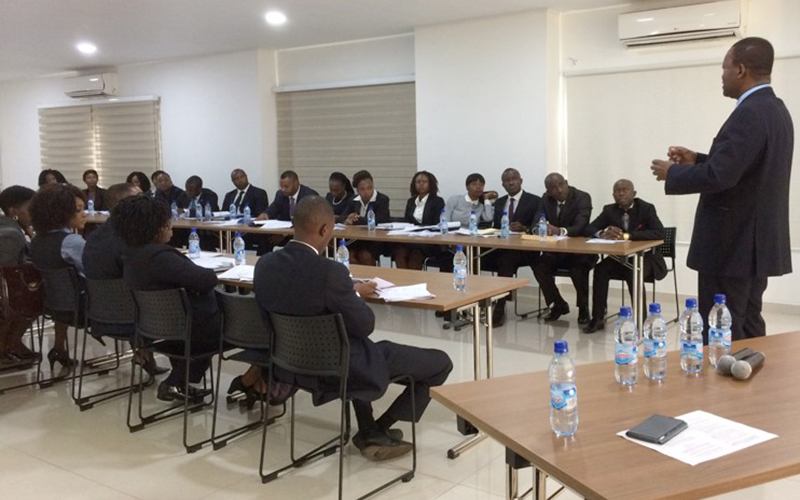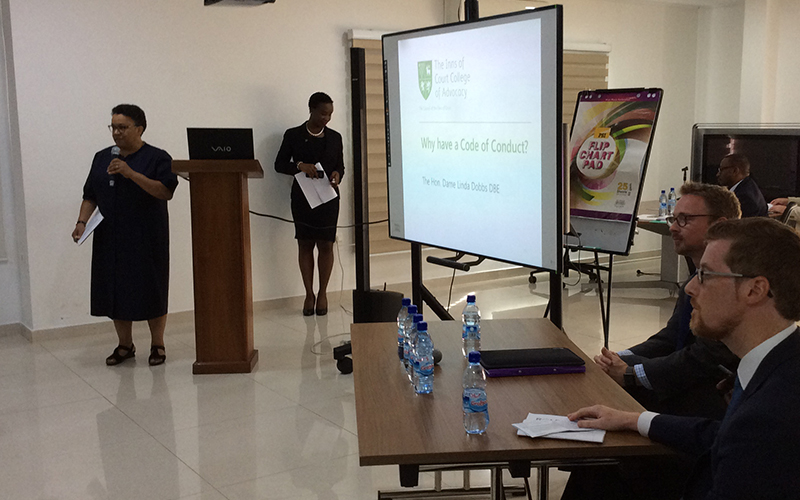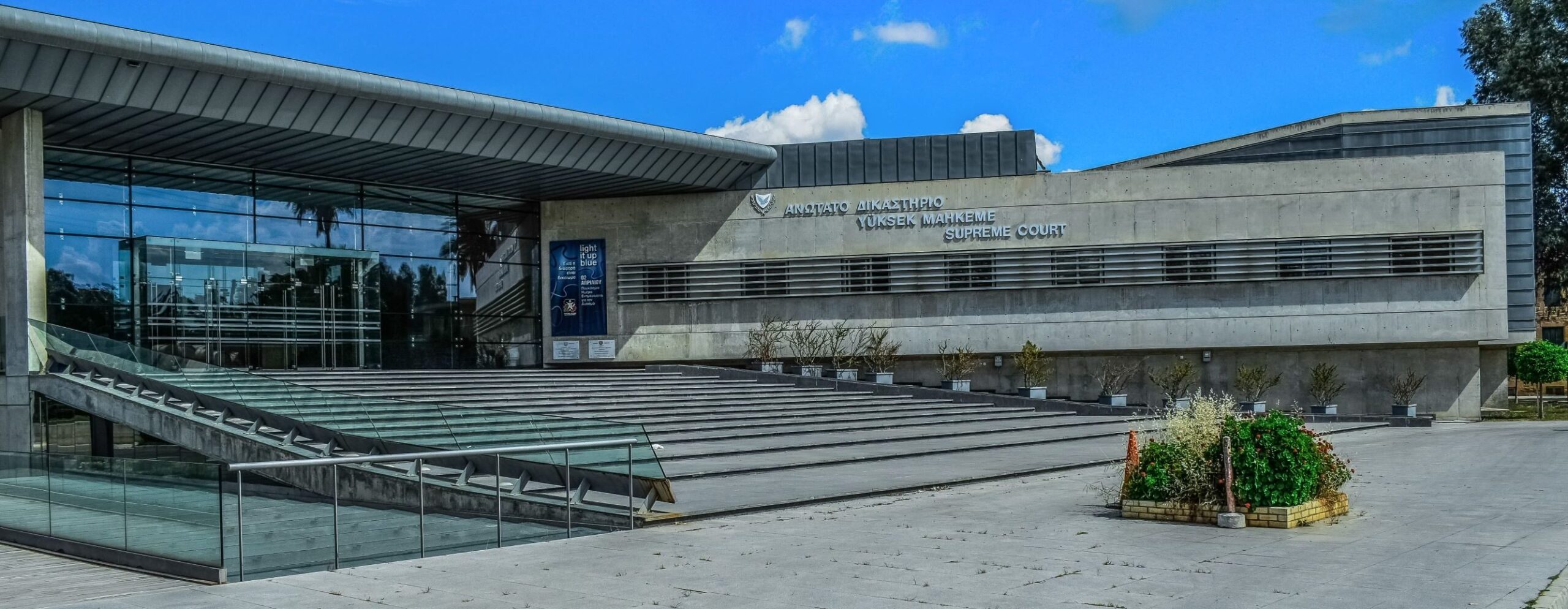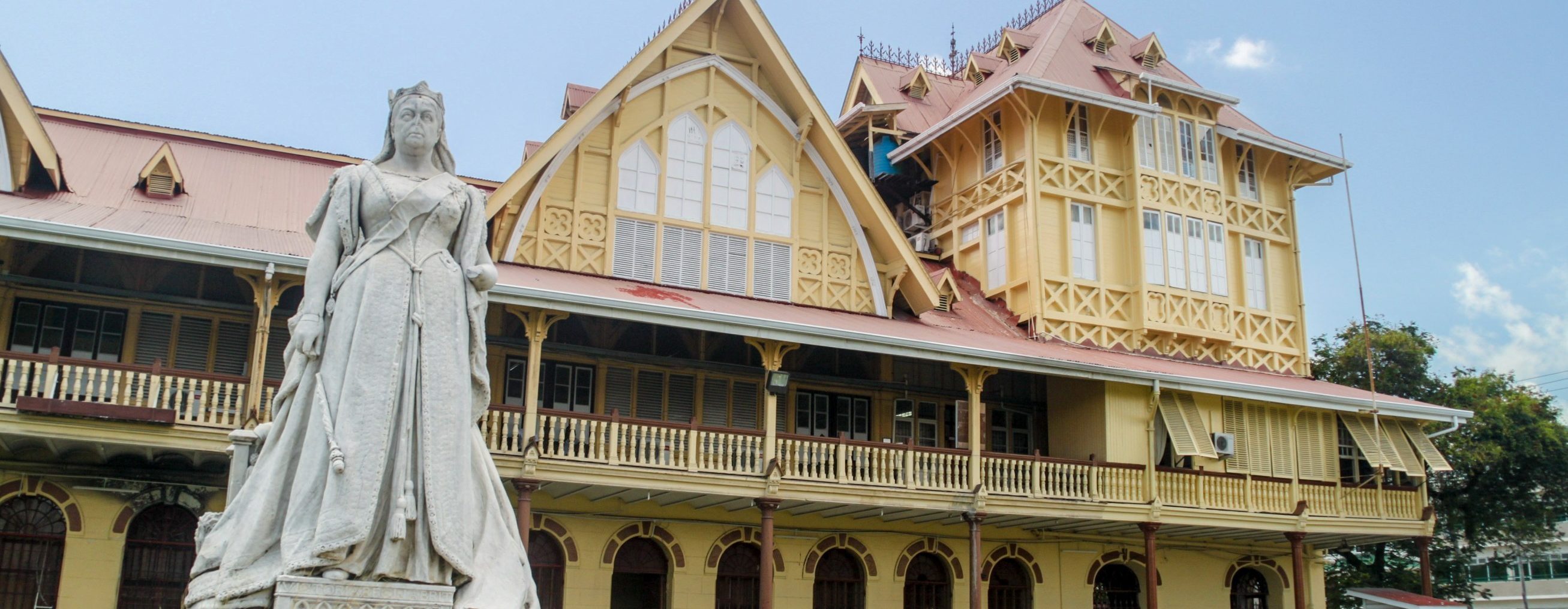Sierra Leone 2016
by Dame Linda Dobbs CBE
Introduction
Six of us visited Sierra Leone on behalf of the College: Peter Birkett QC, Simon Mallett, David Dabbs, Alexander Glassbrook and Gelaga King. I acted as team leader. We were the guests of the Sierra Leone Bar Association (SLBA). The trip was funded by ROLE UK. All of the trainers have been afforded the opportunity to comment on this report.
The Programme
Three of us (myself, Gelaga King and Alexander Glassbrook) had visited Sierra Leone in May 2011, just before the outbreak of Ebola. Then, we conducted a three day programme which included half a day of ethics. The programme on this trip was a three day programme but, due to the concern expressed by the senior judiciary about the ethics and conduct of lawyers, we extended the ethics training to a whole day. Given that concerns had been raised by the judiciary, we extended an invitation to the judiciary for one or more judges to attend and participate in the first day. Justice Browne-Marke one of the most senior judges, attended and did Justice Samba. Both attended on days one and two.
Forty participants signed up for the programme. There were apparently many others who had wanted to attend, but a ceiling of l.iO had been imposed. By the time the opening session on Day One started, there were only 28 participants; but by lunch time the figure had increased to 33. As the lawyers were not paying for the course, there is always the risk that some will drop out at the last moment, as cases come up unexpectedly bringing with them the prospects of reward. On Day Two there were 31 participants and on Day Three, 33.
Certificates of completion were handed out for only those who attended the three days.
There was very good gender balance amongst the trainees (precisely so in the case of the 28 who attended from the outset). We were careful to replicate that balance when we organised the smaller teaching groups. So far as we could tell, participation and ability were well balanced in gender terms. These were very positive signs- both for future trainings and as a sign of growing strength in the Sierra Leone Bar.

The course was opened by Rhoda Nuni, the President of the Sierra Leone Bar. She emphasised the importance of the course and the need and desire of the lawyers to receive such training. We were fortunate in that the Deputy British High Commissioner Paul McGrade was present at the opening. A former lawyer, he also emphasised the importance of such training and set out in general terms the work in Sierra Leone being done by the HMG and DFID. Guy Warrington, the British High Commissioner, popped in later during the day to introduce himself to the participants and to see how the course was progressing.
Day One
Day One was a day of ethics. I started off proceedings with a talk on Ethics. The talk concentrated on why adherence to the Code of Conduct was important and how the reputation of the legal profession depended on the integrity and competence of all practitioners. A talk delivered by Justice Browne-Marke about the “Do’s and Don’ts in court” followed. Justice Browne-Marke emphasised the importance of proper dress, conduct, focusing on the issues, knowing the law and procedure and assisting the court.
A short session followed in which issues raised by the practitioners were put to Justice Browne Marke. The most pressing were complaints about the delay in delivery of judgments; insufficiently detailed notes of evidence and submissions made by the judges (it should be noted that at present the judges notes represent the formal record of proceedings); inconsistent rulings by judges and magistrates with equal jurisdiction on the same legal issue; judges adjourning cases as a matter of routine and judges and magistrate being discourteous.
Justice Browne-Marke explained the difficulty of judges presently. This was due to the shortage of high court judges and the workload of the judges. He explained that new legislation would be introducing case management procedures which would streamline cases. This, it was hoped would make the allocation of judges’ workloads more consistent. I pointed out that the lawyers could help the judges in relation to delay and the notes of evidence by preparing the cases better, focusing on the real issues and providing the courts with skeleton arguments and properly indexed bundles. This would make the job of the judge much easier when preparing judgments. She also highlighted the fact that work was being done on the creation of a curriculum for judicial training as well as looking at ways to ensure that judges, magistrates and lawyers are up to date with the law.
The participants then went into four break-out groups to consider the first of two sets of ethical problems which I had prepared for use in Sierra Leone in May 2014. They were amended slightly, for the present visit. Gelaga King and I floated between the four groups. The ethics problems were later discussed in plenary with each group giving feedback as to the consensus or otherwise of the groups’ conclusions.
After lunch the participants returned to plenary to discuss the fruits of the deliberations of the various groups. Justice Miatta Samba joined us and made some useful interventions. Gelaga King followed with a talk on “Ethics – the media, social and personal relationships and behaviour”. Some hypothetical situations were discussed in plenary as were some ethical questions which had been devised by the Sierra Leonean Bar Association.
The feedback from the trainers was that there was healthy debate of the ethical problems and a divergence of approaches during the break-out groups. There were some practitioners who were acquainted with their Code of Conduct and the principles, but many others less so. This was due to the fact that some lawyers had received some ethics training at law schools, whereas many had not. This is because for a period of time, the law school had removed the study of ethics from the curriculum. This has now been rectified. There will be ethics and advocacy training from the beginning of November. We have indicated that we are willing to assist in providing supporting materials for the training. The offer was warmly received.
Justice Browne-Marke and Justice Samba indicated that they found the debates very illuminating. They both felt that the time spent on the ethics questions, as requested by the judiciary, was clearly most beneficial.
Days Two and Three
Days Two and Three centred on advocacy. The details can be found in the programme. (Appendix 2) The case study was “The State vs. Sahr Joe”, a case which has been regularly used in advocacy training overseas. This is the case involving an altercation in a bar. Samina Bhatia, the DFID representative popped in very briefly to watch an advocacy training session. After having been introduced, she asked the participants what they had learnt. Mercifully for us, the participants enthusiastically told her. From the trainers perspective, it was a very useful exercise, as we realised that the participants, by and large, were already on day one of the advocacy training taking on board the advice they had been given.
General Observations: The Programme
So far as the ethics part of the course is concerned, there was a good awareness amongst most of the practitioners of the appropriate course of conduct. Sadly, there were one or two who, despite clarity in the Code of Conduct, could not see problems in certain unacceptable practices. Having said that, there was, unlike in the previous visit, a very high degree of consensus on the appropriate responses to the problem questions. The discussions in plenary will hopefully ensure that those who had not quite grasped the essence of their Code of Conduct, were better informed by the end of the day. It is also hoped that an understanding that poor conduct reflects not only on the individual practitioner but the profession as a whole, will lead to peer pressure being brought to bear on those who do not conduct themselves appropriately.

There was a general consensus that the participants were very keen to develop their advocacy skills. The participants were given their roles on the first day. With limited exceptions, the standard of preparation was good. We noted, as often happens, that preparation by the female practitioners was in some cases more thorough than those of the male practitioners! The standard of advocacy was generally satisfactory. As is common, participants were generally less confident in the cross-examination exercises. By the time it came to the replay sessions, their confidence generally was much higher. It is clear that the delayed replay sessions as suggested by Professor Hampel are beneficial. It gives a) time for reflection of the point/s raised by the trainer, b) the opportunity to practice and it avoids the lawyer merely repeating what the trainer’s demonstration. There is no doubt that over the two days of advocacy, the performances of each participant improved.
Because we had been asked to include ethics training in the course, there was no time for video review in the main body of the programme. We offered to do video review of those participants who wished it after the day’s work or over the lunch hour. We did not have video review facilities, so the lawyers were encouraged to bring tablets or use their mobile phones if they wished their performance to be recorded. None in fact took up the offer, but it was noted that trainers fed in some video type review during the replay sessions.
Feedback on the Course
The verbal feedback from the participants and the SLBA was that the course was very well received. It was made clear to us by the lawyers that they wanted similar courses in the future. I told them that we would be looking at providing training to volunteer judges and senior lawyers who were willing to be trained as trainers so that they could, in due course, conduct their own regular training sessions. The response to this, was very positive indeed.
Thirty-four participants completed feedback forms. I am grateful to Phoebe Makin for her analysis of the answers given: see Appendix 3 of the report. The impression they create is one of enthusiasm for the method of teaching. The suggestions for improvement focus on involving more senior practitioners, such as magistrates and judges, in the training as well extending the length of the training and offering refresher courses or ongoing learning materials such as videos or podcasts.
General Observations: The Facilities
In 2014, the course was carried out at the British Council. Although the facilities were fairly basic, there was plenty of space and sufficient break- out rooms. The trainers were accommodated in a hotel near the beach. As a result we had a long daily return journey in heavy traffic. This was very tiring for the trainers. This year the training took place at the Hub hotel. The trainers were accommodated at the hotel. This made a huge difference to the trainers. It reduced the stress and meant that we were much fresher each day. The facilities for copying and internet connections were also better. There was another conference taking place at the hotel so we were limited to two break-out groups. However the members of the hotel staff were very helpful and the rooms were arranged to suit our needs. There were suitable technical facilities available, but there were some hiccups due to the lack of appropriate cables and remotes for the power points and tall stands for the microphones. Despite this we were able to manage with our presentations.
The Administration
Overall the administration was of a very high standard. Our papers and documents were all in order. We were met as arranged; the hotel was very accommodating and efficient. There were a couple of communication issues. We were not aware that break-out rooms had been booked and thus spent an hour or so fruitlessly trying to arrange break-out groups, when they had already been booked. There was some misunderstanding over a document to be included in the bundle- whilst this was easy to rectify, the need for rectification arose out of the trainers and the SLBA not checking all the documents carefully before the final bundle was agreed.
The Social Side
The Sierra Leone Bar Association Executive members extended a kind invitation to us to join them for dinner at a restaurant overlooking the water. The setting was beautiful, with a particularly striking sky that night. Justices Browne-Marke and Samba also joined us. The members of the Executive all expressed their deep gratitude for what was judged to be an invaluable course. Each trainer was presented with a generous local present.
Sadly, there was little time to go to explore. Nevertheless we experienced the hurly burly of Freetown and the sights of the beach when we went out to dinner on two occasions. The water taxi experience from the airport to the city was also a quintessentially Sierra Leonean experience.
The Future
There is no doubt that this trip was a productive and most welcome one. However, for there to be a sustainable impact there needs to be follow up and development. The trip enabled me not only to assess the effectiveness the course but also to discuss with the Bar and the Judiciary the future of advocacy training in Sierra Leone. It appears that there is little or no advocacy training prior to the lawyers getting on their feet in court. They are expected to learn by watching their supervisor. Whilst this is one way of learning, the Hampel method, which is learning by doing, has demonstrated that it is the most effective way of improving advocacy skills. Discussion focused therefore on the future.
As was highlighted in our application to ROLE UK for funding, training, such as we have delivered, is essential in ensuring effective justice and hence promoting the rule of law. Without rigorous and ongoing training the courts are unable to function effectively to ensure the protection of the rights of their people. This training, is the start of improvements to ensure a functioning legal system which will in turn have economical and ethical impacts for all of Sierra Leone.
One of the reasons for asking the Chief Justice to allow one or two judges to attend the training was in order to encourage the judiciary to get involved in advocacy and ethics training. In the UK it is commonplace to have judges conducting advocacy training alongside barristers. There are many benefits in so doing.
I had discussions with the Chief Justice across a range of issues, including whether he was agreeable in principle to some judges being trained as advocacy trainers. He was so agreeable, being able to see the virtue of such a course of action. I have already identified a number of enthusiastic potential judicial trainers.
We had asked for a magistrate also to be present at the first day of training. The reason was because on the previous occasions, many of the practitioners indicated the difficulties they encounter when presenting their cases in the magistrates’ courts. More often than not, the magistrate will take over the questioning of witnesses, with no regard to the practitioner or admissibility of evidence. Sadly, no magistrate attended. I raised this issue with Justice Browne-Marke. He had passed on our original request and was disappointed with the response. If the train the trainers course is to take place, then I will recommend that the Chief Justice select a magistrate to be an advocacy trainer to ensure engagement by the magistracy.
The President of the Bar is very keen to develop a faculty of local advocacy trainers in order that the Bar can conduct its own advocacy training in the future. We would propose that this is implemented in stages. The ICCA is very willing to assist the Sierra Leone Bar to develop its own faculty of advocacy trainers and the following programme would be our proposal of the most appropriate route to establishing a core pool of trainers in Sierra Leone. This is critical to sustainability and ensuring high standards of advocacy. For the training to be effective, we envisage that three further trips would be necessary.
The first trip would involve a further round of standard advocacy training to accommodate those that were unable to attend this round due to the limited number of places. This will be coupled with an advanced advocacy course to encourage more senior advocates who would be suitable for the “train the trainer” course to attend.
The second round of training would consist of a further round of standard advocacy training (if needed) along with a train the trainer course. Coupling these two courses enables those on the train the trainer course to gain practical experience of using the Hampel Method in training those on the standard course.
The final proposed trip would be for 2 or 3 trainers to return to observe the SLBA led training in action and to offer support to the trainers that have been previously undergone the ICCA “train the trainers” training. This model has worked in Zimbabwe and Ghana. By the time the trainers come to conduct their second and subsequent courses, they are fully confident and competent. Funding will have to be sought.
Ethics and advocacy training is just starting at the Law School. Glenna Thompson a very well respected and experienced lawyer is conducting the training. I have offered her whatever support we are able to give. One suggestion has been the creation of Podcasts on the advocacy topics covered in our training -featuring a talk and demonstration. That, Ms Thompson said would be an invaluable aid. The participants of the course also indicated that they would find such a tool of great assistance to embed what they had learnt on the course. The cost is a time issue rather than a financial one. We will consider how this idea can be taken forward.
There was also discussion with the President of the Bar as to how we could offer support to the law graduates/young practitioners. There are a number of possibilities which we will explore via both the ICCA and the UK Sierra Leone Pro Bono Network, the latter which has links with some law schools in the UK who are interested in collaborating with their opposite numbers in Sierra Leone.
Conclusion
This was both a very enjoyable and successful visit. Not only did we form good relationships with the SLBA and the lawyers, but we also opened lines of communication between the judiciary and lawyers and the judiciary and ourselves. None of this would have been possible without the financial, administrative and moral support of ROLE UK and the administrative skills of Phoebe Makin at the ICCA. Our trainers were superb. We got on very well as a team and this was key to the success of the course. I express my profound thanks to them for their enthusiasm and professionalism. I would also like to extend my thanks to Mamo Turay the secretary of the UK Sierra Leone Pro Bono Network who attended each day of the training, assisted with administration, facilitated and attended my meetings with the Chief Justice, the senior judiciary and representatives of DFID and other donors.


